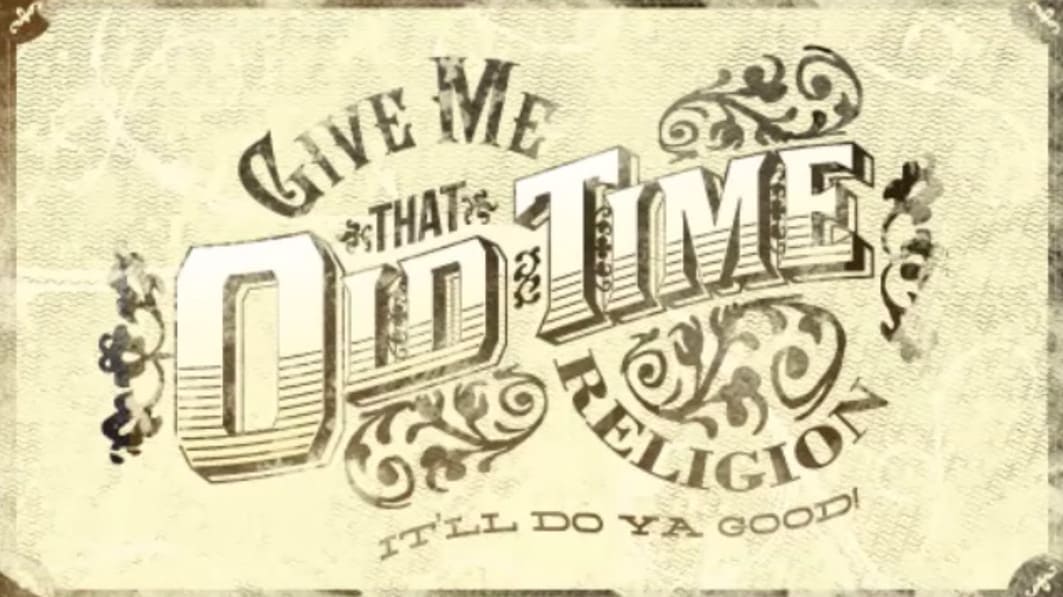Readers of certain denominations and eras may be familiar with the classic Gospel song, “Old Time Religion” – a 19th century tune whose staying power would seem to suggest fervency of faith has always been a point of great concern and debate.
Well, 146 years since the song’s composition in 1873, recent modern-day events continue to point to Christianity’s waning influence and desperate need in the United States.
First, a Pew Research Center study published last week found that the number of American adults who identify as Christian dropped 12 percentage points over the last 10 years. Religiously unaffiliated Americans – also known as religious “nones” – grew from 17% in 2009 to 26% in 2019.
While the Pew Report likely does not indicate a decline in confessional Christians, it does suggest Christianity’s influence in society is diminishing.
A second event was the media’s hostile response to Attorney General Barr’s speech at the University of Notre Dame on October 11. Drawing from the Founding Fathers, Barr argued that religion and traditional morality is essential to democracy.
Writer Joan Walsh said Barr was “a paranoid right-wing Catholic ideologue who won’t respect the separation of church and state.”
One Roman Catholic academic, C. Colt Anderson, told the Guardian that Barr’s conservative religious beliefs were a “threat to American democracy.”
His critics notwithstanding, Attorney General William Barr’s message is a timely reminder that religion plays a crucial role in a free society.
Barr highlights three reasons our nation needs religion:
1. Religion prevents individuals from harming others
Original sin is a central truth of Classical Christian teaching. Because Adam sinned in the Garden of Eden, all of his descendants have inherited a sinful nature. Although men have the potential to do good, they are disposed to do evil in their fallen state.
In his speech, Barr quoted Edmund Burke, who said, “Society cannot exist unless a controlling power be placed somewhere … It is ordained in the eternal constitution of things that men of intemperate minds cannot be free.”
The Founding Fathers shared Burke’s belief that the appetites of sinful men left unchecked would destroy community life.
If a society relies on the state to regulate the conduct of its citizens, the government will become tyrannical.
Religion, on the other hand, is a non-coercive means of restraining men’s appetites. It instills the moral discipline and virtue necessary for men to rule themselves.
This is why the founders believed the citizens of a free society must be religious. John Adams wrote, “We have no government armed with the power which is capable of contending with human passions unbridled by morality and religion. Our Constitution was made only for a moral and religious people. It is wholly inadequate for the government of any other.”
2. Disregard for traditional morals has terrible consequences for society
Christians believe in a transcendent moral order. Judeo-Christian morality says there are objective standards of right and wrong that we can know. There are painful consequences when we violate moral laws.
Modern secularists reject natural law and Christian ethics. The so-called progressive movement has caused great misery, but progressives insist on denying the benefits of traditional Christian morality.
The sexual revolution of the 1960s and disregard for Christian sexual morality has caused immense emotional, financial, and relational damage, especially for women and their children.
Only 33% of U.S. liberals believe that “marriage is needed to create strong families.” Yet, social science shows there are clear advantages to a two-parent household, not the least of which are greater emotional and material security and an ideal environment for raising children.
As Barr noted, in recent years we have seen record levels of suicide and mental illness. There has been an increase in inexplainable violence in addition to a drug epidemic.
“Modern secularists dismiss this idea of morality as other-worldly superstition imposed by a kill-joy clergy,” Barr said. “In fact, Judeo-Christian moral standards are the ultimate utilitarian rules for human conduct.”
3. Government regulation is not an effective solution to societal ills
Christianity teaches that individuals should strive for individual moral improvement and that our personal conduct will improve society. Barr calls this moral system “micro-morality.”
Secularists operate under a different morality, called “macro-morality.” According to this system, morality is measured by one’s support of collective action and social justice movements.
With the growth of secularism, there has been greater demand for government to alleviate all social problems.
As Barr noted, government has formed the welfare state as the solution to the breakdown of the family, legalized abortion as the response to a growing illegitimacy rate, and created safe injection sites in reaction to drug addiction.
These social programs, however well-intentioned, fall woefully short because they seek to correct symptoms instead of causes. Because personal misconduct is the underlying cause of our nation’s problems, government regulation is not an effective solution to societal ills.
Barr concludes, “The fact is that no secular creed has emerged capable of performing the role of religion.”
Modern secularists will continue to deny it, but our nation still needs what men and women of yesteryear pleaded and sang for – “Give me that old-time religion … it was good for my old mother … it was good for the Hebrew children … it was good for Paul and Silas … it was good for my old father … and it was (and still is) good enough for me.”






